Intro
Discover hypoglycemia symptoms, feelings, and warning signs, including low blood sugar effects, glucose imbalance, and diabetic shock risks, to manage and prevent severe episodes.
Hypoglycemia, also known as low blood sugar, is a common condition that occurs when the level of glucose in the blood falls below a certain threshold. It can be a side effect of diabetes treatment, but it can also occur in people without diabetes. Recognizing the symptoms and feelings associated with hypoglycemia is crucial to prevent complications and ensure prompt treatment. In this article, we will delve into the world of hypoglycemia, exploring its causes, symptoms, and treatment options.
The importance of understanding hypoglycemia cannot be overstated. It is a condition that can affect anyone, regardless of age or health status. People with diabetes are particularly at risk, as they often rely on medications or insulin to regulate their blood sugar levels. However, hypoglycemia can also occur in people without diabetes, especially after intense physical activity, fasting, or consuming excessive amounts of alcohol. By learning more about hypoglycemia, individuals can take proactive steps to prevent it and manage its symptoms effectively.
Hypoglycemia can be a frightening experience, especially for those who are not familiar with its symptoms. It can cause a range of feelings, from mild discomfort to severe anxiety and panic. In some cases, hypoglycemia can even lead to loss of consciousness, seizures, or other serious complications. Therefore, it is essential to recognize the warning signs of hypoglycemia and take immediate action to prevent further deterioration. By doing so, individuals can ensure their safety and well-being, as well as the well-being of those around them.
Hypoglycemia Causes And Risk Factors
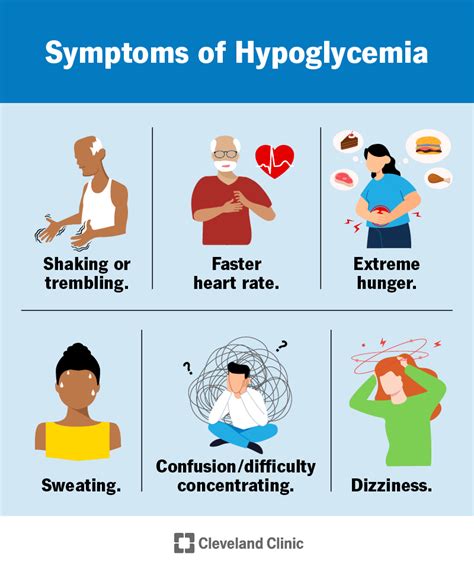
Hypoglycemia can be caused by a variety of factors, including medications, skipped meals, and excessive physical activity. In people with diabetes, hypoglycemia is often a side effect of insulin or oral medications that lower blood sugar levels. Other risk factors include certain medical conditions, such as kidney or liver disease, and hormonal imbalances. Additionally, some people may be more prone to hypoglycemia due to their genetic makeup or lifestyle habits. Understanding these causes and risk factors is crucial to preventing hypoglycemia and managing its symptoms effectively.
Some common causes of hypoglycemia include:
- Taking too much insulin or oral diabetes medications
- Skipping meals or delaying eating
- Engaging in intense physical activity without adequate food or rest
- Drinking excessive amounts of alcohol
- Having certain medical conditions, such as kidney or liver disease
- Experiencing hormonal imbalances, such as adrenal insufficiency
Hypoglycemia Symptoms In Adults
Hypoglycemia symptoms can vary from person to person, but common signs include shakiness, dizziness, sweating, and hunger. In some cases, hypoglycemia can cause more severe symptoms, such as confusion, slurred speech, and loss of consciousness. It is essential to recognize these symptoms and take immediate action to prevent further deterioration.Some common symptoms of hypoglycemia in adults include:
- Shakiness or tremors
- Dizziness or lightheadedness
- Sweating or clamminess
- Hunger or nausea
- Headaches or fatigue
- Confusion or difficulty concentrating
- Slurred speech or difficulty speaking
Hypoglycemia Symptoms In Children
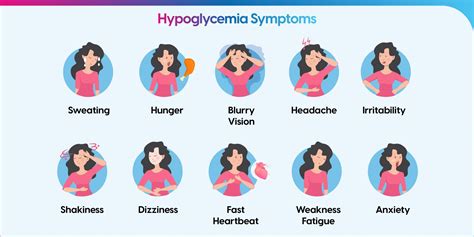
Hypoglycemia symptoms in children can be different from those in adults. Children may exhibit behavioral changes, such as irritability, anxiety, or restlessness, and may also experience physical symptoms like shakiness, sweating, or hunger. In some cases, hypoglycemia can cause more severe symptoms, such as seizures or loss of consciousness, which require immediate medical attention.
Some common symptoms of hypoglycemia in children include:
- Irritability or mood changes
- Anxiety or restlessness
- Shakiness or tremors
- Sweating or clamminess
- Hunger or nausea
- Headaches or fatigue
- Confusion or difficulty concentrating
Hypoglycemia Treatment Options
Hypoglycemia treatment options depend on the severity of the condition. Mild hypoglycemia can be treated with glucose tablets, juice, or other sugary snacks, while more severe cases may require medical attention. In some cases, hypoglycemia can be prevented by adjusting medication dosages, eating regular meals, and engaging in moderate physical activity.Some common treatment options for hypoglycemia include:
- Glucose tablets or gel
- Juice or other sugary drinks
- Snacks like crackers, cookies, or candy
- Adjusting medication dosages or types
- Eating regular meals and snacks
- Engaging in moderate physical activity
Hypoglycemia Prevention Strategies
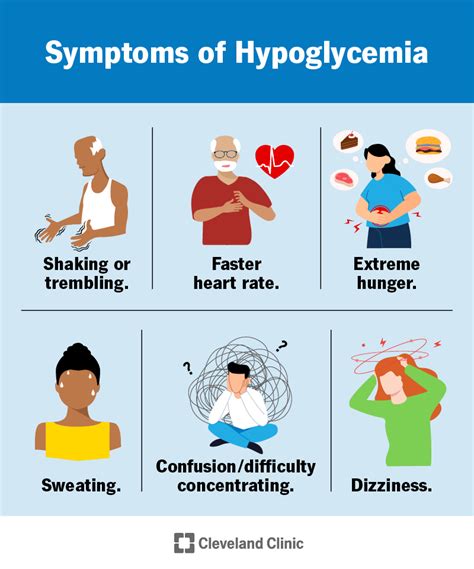
Hypoglycemia prevention strategies include eating regular meals, monitoring blood sugar levels, and adjusting medication dosages as needed. Additionally, individuals can take steps to prevent hypoglycemia by avoiding excessive physical activity, drinking plenty of water, and getting enough rest.
Some common prevention strategies for hypoglycemia include:
- Eating regular meals and snacks
- Monitoring blood sugar levels regularly
- Adjusting medication dosages or types as needed
- Avoiding excessive physical activity
- Drinking plenty of water
- Getting enough rest and sleep
Hypoglycemia And Diabetes
Hypoglycemia is a common complication of diabetes, particularly in people who take insulin or oral medications to lower their blood sugar levels. However, hypoglycemia can also occur in people without diabetes, especially after intense physical activity, fasting, or consuming excessive amounts of alcohol. Understanding the relationship between hypoglycemia and diabetes is essential to managing the condition effectively.Some common ways to manage hypoglycemia in people with diabetes include:
- Monitoring blood sugar levels regularly
- Adjusting medication dosages or types as needed
- Eating regular meals and snacks
- Avoiding excessive physical activity
- Drinking plenty of water
- Getting enough rest and sleep
Hypoglycemia And Other Medical Conditions
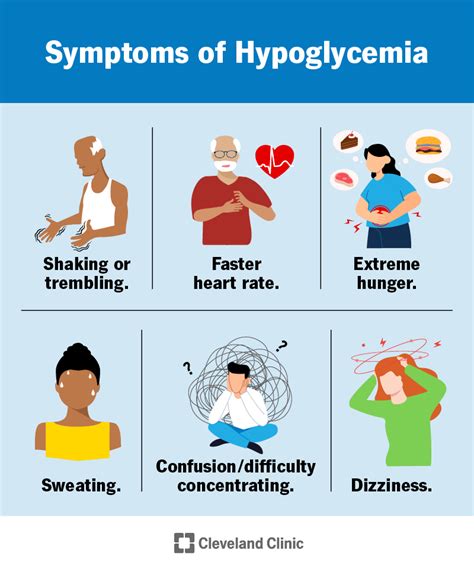
Hypoglycemia can be a complication of other medical conditions, such as kidney or liver disease, and hormonal imbalances. In some cases, hypoglycemia can be a side effect of certain medications, such as beta-blockers or certain antibiotics. Understanding the relationship between hypoglycemia and other medical conditions is essential to managing the condition effectively.
Some common medical conditions that can increase the risk of hypoglycemia include:
- Kidney disease
- Liver disease
- Hormonal imbalances, such as adrenal insufficiency
- Certain medications, such as beta-blockers or certain antibiotics
- Cancer or other chronic illnesses
Hypoglycemia And Lifestyle Habits
Hypoglycemia can be influenced by lifestyle habits, such as diet, exercise, and sleep patterns. Eating a balanced diet that includes plenty of fruits, vegetables, and whole grains can help regulate blood sugar levels and prevent hypoglycemia. Additionally, engaging in moderate physical activity and getting enough rest and sleep can help manage stress and prevent hypoglycemia.Some common lifestyle habits that can help prevent hypoglycemia include:
- Eating a balanced diet that includes plenty of fruits, vegetables, and whole grains
- Engaging in moderate physical activity, such as walking or yoga
- Getting enough rest and sleep, aiming for 7-8 hours per night
- Managing stress through relaxation techniques, such as deep breathing or meditation
- Avoiding excessive alcohol consumption and smoking
Hypoglycemia And Mental Health
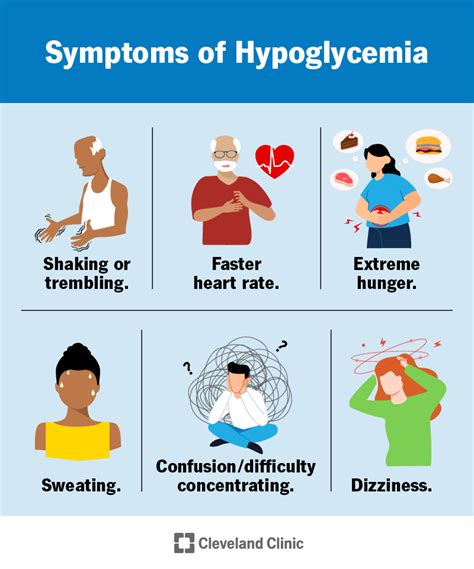
Hypoglycemia can have a significant impact on mental health, particularly in people who experience recurring episodes. Hypoglycemia can cause anxiety, depression, and other mental health issues, particularly if left untreated. Understanding the relationship between hypoglycemia and mental health is essential to managing the condition effectively.
Some common ways to manage hypoglycemia and mental health include:
- Seeking professional help from a mental health expert
- Practicing relaxation techniques, such as deep breathing or meditation
- Engaging in regular exercise and physical activity
- Eating a balanced diet that includes plenty of fruits, vegetables, and whole grains
- Getting enough rest and sleep, aiming for 7-8 hours per night
Hypoglycemia And Nutrition
Hypoglycemia can be influenced by nutrition, particularly in people who have diabetes or other medical conditions. Eating a balanced diet that includes plenty of fruits, vegetables, and whole grains can help regulate blood sugar levels and prevent hypoglycemia. Additionally, avoiding sugary drinks and snacks can help manage blood sugar levels and prevent hypoglycemia.Some common nutritional strategies for managing hypoglycemia include:
- Eating a balanced diet that includes plenty of fruits, vegetables, and whole grains
- Avoiding sugary drinks and snacks
- Choosing complex carbohydrates, such as whole grains and legumes
- Incorporating healthy fats, such as nuts and seeds, into the diet
- Drinking plenty of water and limiting caffeine intake
Hypoglycemia And Exercise
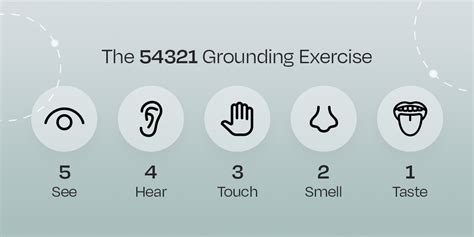
Hypoglycemia can be influenced by exercise, particularly in people who have diabetes or other medical conditions. Engaging in moderate physical activity, such as walking or yoga, can help regulate blood sugar levels and prevent hypoglycemia. However, intense physical activity can increase the risk of hypoglycemia, particularly if not balanced with adequate food and rest.
Some common exercise strategies for managing hypoglycemia include:
- Engaging in moderate physical activity, such as walking or yoga
- Avoiding intense physical activity, particularly if not balanced with adequate food and rest
- Monitoring blood sugar levels before, during, and after exercise
- Eating a balanced diet that includes plenty of fruits, vegetables, and whole grains
- Staying hydrated by drinking plenty of water
Hypoglycemia And Travel
Hypoglycemia can be a challenge when traveling, particularly for people who have diabetes or other medical conditions. It is essential to plan ahead, packing snacks and medications, and monitoring blood sugar levels regularly. Additionally, informing travel companions or tour guides about hypoglycemia can help ensure prompt treatment in case of an emergency.Some common travel strategies for managing hypoglycemia include:
- Packing snacks and medications, such as glucose tablets or insulin
- Monitoring blood sugar levels regularly, particularly when traveling across time zones
- Informing travel companions or tour guides about hypoglycemia
- Carrying a hypoglycemia emergency kit, including snacks, medications, and a glucometer
- Staying hydrated by drinking plenty of water
Hypoglycemia And Work
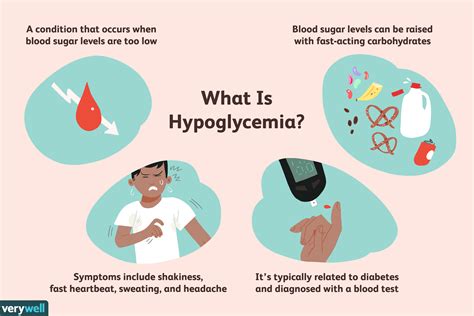
Hypoglycemia can be a challenge in the workplace, particularly for people who have diabetes or other medical conditions. It is essential to inform employers and colleagues about hypoglycemia, and to have a plan in place in case of an emergency. Additionally, taking regular breaks to monitor blood sugar levels and eat snacks can help prevent hypoglycemia.
Some common workplace strategies for managing hypoglycemia include:
- Informing employers and colleagues about hypoglycemia
- Having a plan in place in case of an emergency, including a hypoglycemia emergency kit
- Taking regular breaks to monitor blood sugar levels and eat snacks
- Avoiding strenuous physical activity, particularly if not balanced with adequate food and rest
- Staying hydrated by drinking plenty of water
What are the symptoms of hypoglycemia?
+Hypoglycemia symptoms can vary from person to person, but common signs include shakiness, dizziness, sweating, and hunger. In some cases, hypoglycemia can cause more severe symptoms, such as confusion, slurred speech, and loss of consciousness.
How can I prevent hypoglycemia?
+Hypoglycemia prevention strategies include eating regular meals, monitoring blood sugar levels, and adjusting medication dosages as needed. Additionally, individuals can take steps to prevent hypoglycemia by avoiding excessive physical activity, drinking plenty of water, and getting enough rest and sleep.
What should I do if I experience hypoglycemia?
+If you experience hypoglycemia, it is essential to take immediate action to prevent further deterioration. Treatment options include glucose tablets, juice, or other sugary snacks, as well as adjusting medication dosages or types. In some cases, hypoglycemia can require medical attention, particularly if symptoms are severe or persistent.
In conclusion, hypoglycemia is a common condition that can affect anyone, regardless of age or health status. Recognizing the symptoms and feelings associated with hypoglycemia is crucial to preventing complications and ensuring prompt treatment. By understanding the causes, symptoms, and treatment options for hypoglycemia, individuals can take proactive steps to manage the condition effectively and maintain their overall health and well-being. We encourage readers to share their experiences and tips for managing hypoglycemia, and to ask questions or seek guidance from healthcare professionals if needed. Together, we can work towards a better understanding of hypoglycemia and its impact on our lives.
